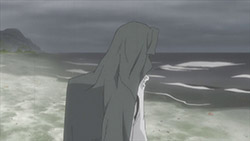 |
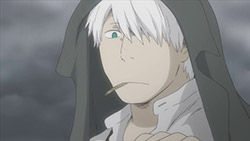 |
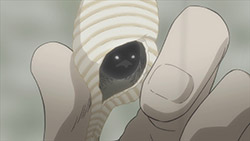 |
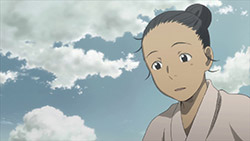 |
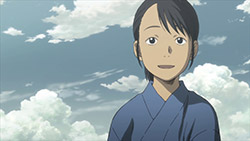 |
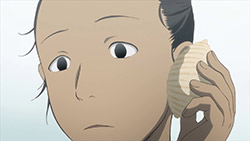 |
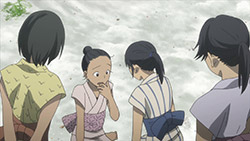 |
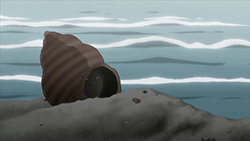 |
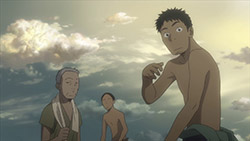 |
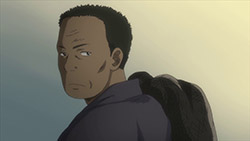 |
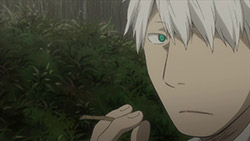 |
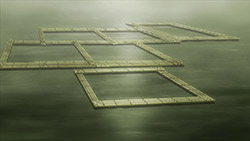 |
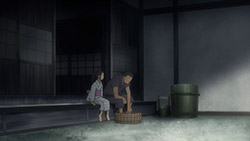 |
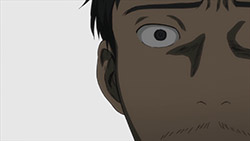 |
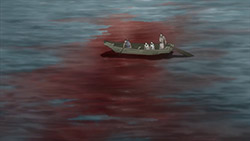 |
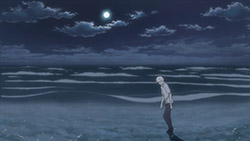 |
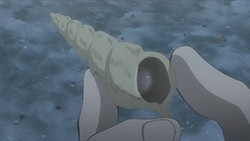 |
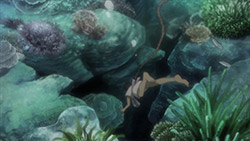 |
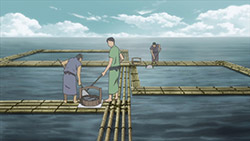 |
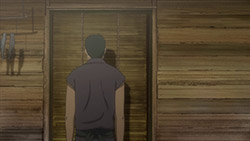 |
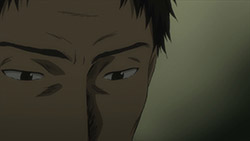 |
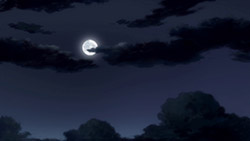 |
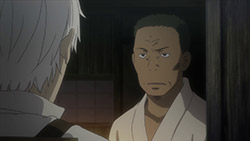 |
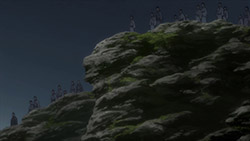 |
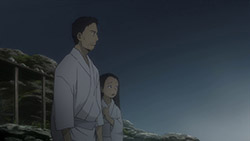 |
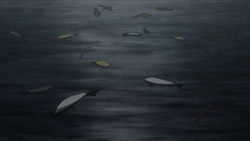 |
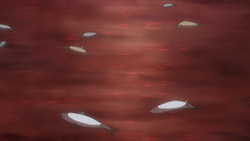 |
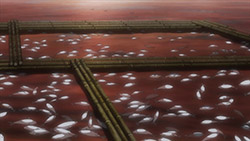 |
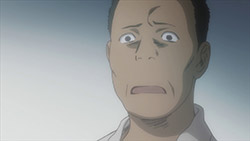 |
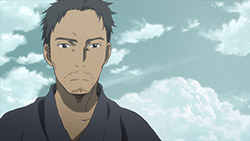 |
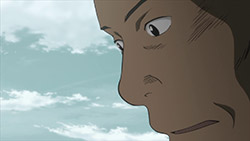 |
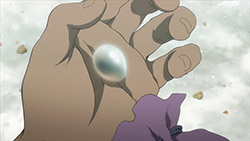 |
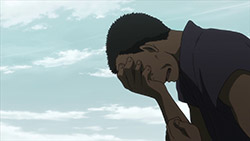 |
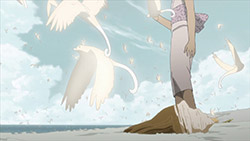 |
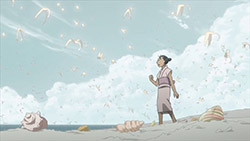 |
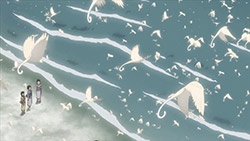 |
「囀る 貝」 (Saezuru Kai)
“The Warbling Sea Shell”
Another wonderful episode of Mushishi. Is that the sun setting in the west I see?
Has there been another multi-cour anime as consistent as Mushishi? It may not be in a class by itself, but it sure doesn’t take long to call the roll. What’s truly astonishing is that the transition to the second season has been so utterly seamless – I’ve seen some jokingly call last week’s premiere “Episode 27” but that’s not so far-fetched. The better part of a decade has passed but Mushishi doesn’t look much different, sound much different or feel much different. If we still heard “The Sore Feet Song” every week I might almost believe it was 2005.
That consistency and the self-contained, confident perfection of Mushishi can make this quite a difficult series to blog. This is a lament you’ve heard from me before, but it’s true – when a show makes its statement as clearly and succinctly as this one does, it doesn’t leave a whole lot that needs to be said. It leaves me to muse on questions such as on what Nagahama Hiroshi (who handles scripts as well as directing Mushishi) bases his decisions about what order to adapt chapters.
There are certain exceptions – last week’s premiere was the premiere for obvious reasons – but in general, every chapter/episode of Mushishi is like a little movie. They’re timeless in the same way Ginko and the series setting are – literally removed from time. Every so often we get a “signpost” episode that refers to earlier events or returns a character, but they’re fairly uncommon. Just as it’s impossible to say what time period Mushishi is set in and how Ginko relates to it, with probably 80% of the chapters I think it would be difficult to place them in any inherent sequential order. The good thing, of course, is that with this rebirth we’re going to see every one of them adapted in time (and the one airing in two weeks is one I especially look forward to, as it’s one of my favorites).
After two weeks, it feels as if Nagahama has intentionally chosen to ease the audience back into the Mushishi experience after such a long absence. The premiere was first because it directly played off events in Episode 26, but neither of the first two episodes has offered much in the way of conflict, tragedy or heartbreak. These have been gentle, contemplative stories (of which this series has many) where Mushi are mostly beneficial and even helpful forces for the human characters. They certainly aren’t all like that – this can be a very frightening and terribly sad series when it wants to be – but I suspect that side of Mushishi has intentionally been deferred for a little while.
As Mushi go, they don’t get much more benign than the Yadokaridori. Not only are they the reason tragedy is averted this week, but they’re freaking adorable too. Seagoing Mushi that resemble small seabirds, when they sense disaster coming they head for land and take shelter in abandoned sea shells like hermit crabs, singing to call their brethren in as well. Their tiny birdlike cries (the “Warbling Sea Shells”) catch the attention of a passing Ginko, who realizes that a disaster must be coming, and proceeds to warn the residents of a small fishing village – starting with a young girl named Mina (Tsuda Ayaka – another real child in a child’s role) and her father Sakichi (Naka Hirofumi). They live by themselves on the cliff above the village, the father refusing to allow his daughter to mingle after her mother was killed by a shark ten years earlier.
In truth, “The Warbling Sea Shell” is mostly a human drama about human relationships. Sakichi blames the village elder (Yara Yuusaku) for his wife’s death because he pulled his own wife out of the water first; in truth he knows he would have done the same, and it’s a cover because he blames himself for trusting her life to another. The Elder is so consumed by guilt that he concocts a fish farming scheme (whatever timeframe Mushishi is set in, this is ahead of it – by a lot) to make sure it never happens again. No one blames Ginko for being the bearer of bad news, or even disbelieves his warning. The only real Mushi-caused drama here is Mina losing her voice, because that’s what happens when a human listens to the Yadokarodori’s song too closely – and even that is temporary, and gives Ginko a good reason to argue that Mina should be allowed to interact with the village children (hearing more voices means learning how to talk again that much faster).
As with so much that is Mushishi, the sum of the experience is the feeling it creates – it really is like a form of meditation. There is a disaster (a red tide), but thanks to Ginko and the Yadokaridori no one is killed. Old pain doesn’t go away, but is dulled to the point where common sense prevails, and the needs of the many outweigh the needs of the few – or the one. And the sublime moment comes when the Yadokaridori leave their shells en masse and return to the sea in a flutter of thousands of wings, as Mina discovers a special ability that few humans share. It’s the sort of quiet, reflective beauty that no other anime provides in quite the same way Mushishi does, and gives us all yet more cause to celebrate that it’s miraculously back on our screens.

Already one of my favorite episodes.
I like how the episode’s theme is built on how there’s foreshadowing of impending tragedy and what makes people prepare for it, only to have no matter how many precautions one takes it doesn’t stop misfortune from happening to the family you try to protect by isolating from others (Mina and her muteness through ill chance) or from natural occurring tragedies like red tide ruining everything you built up for. I think this episode does a nice quiet way for a man like Sakichi to overcome his trauma and grief by having to relive a similar event via the red tide, and understanding that there wasn’t anything that could have been done by the village Elder or himself with what happened to his family.
This episode was good and all of course, but it visually bothered me that when the characters were looking for shells at the water’s edge, they were standing ON the water rather than in it.
Sounds like Jesus to me
Amazing episode. I can imagine how difficult it is to write about this show, but I enjoyed reading it.
So far i’m glad that the animation on the show still remains solid and consistent. I was a bit wary at first considering some CG used on Hihamukage.
Nevertheless, it’s another great episode.
I was worried about the same thing for the same reason but so far, so good.
So many feels. Mushishi is one of the few anime that can make me feel so much in one self contained episode.
And that ending scene was beautiful.
do you guys know what manga chapters were adapted in this episode and in the premiere?
The first three episodes are from Volume 6. The next episode will be Yuki no Shita “Under the Snow” – one of the most heartbreaking episodes you will see in a while. There was also another Volume 6 material in the first season – “String from the Sky” which was my most favorite episode of the first season.
I’ll have to admit i’m sinful of not watching Mushishi until just recently (in fact i just finished watching it), and by god .. what a beautiful series it is .. the feelings it evokes are subliminal and deep .. but if i would put it in the layman anime-fan words i’d say “If Studio Ghibli ever made a TV series Mushishi would be it”.
It has that amazing sense of wonder and discovery you get with every new case and every new well-thought Mushi… it even takes things farther than Ghibli movies by being aimed solely towards mature audience not family like Ghibli movies, some of the stories are so dark, heart-crushing and depressing you simply need a break after it to contemplate what happened and move on to the next episode .. and it’s so effective that near the end of every episode i keep crossing my fingers as if i’m repeatedly whispering “please have a good ending, please have a good ending !!!”, it really is capable of creating a very wide spectrum of emotions and it does everything it it’s disposal to evoke them .. whether it’s the evocative music, Ginko’s laid back character and voice, the beautiful art and animation, the contrast between how simple the reason Mushi do what they do (just feeding and surviving) and the complexity and depth that comes from the bizarre ways they do that and how much impact they have on the people around them.
Long story short .. i loved it so much (amazing OP too, for both seasons), It’s like this generation’s bed-time stories .. some of the stories were soooo good i’d say they are on par with timeless tales like Red-Riding Hood and other Brothers Grimm folkloric tales.
Can’t wait to see what the 2nd season has to offer ^_^
Just watched the episode to see if I like it (after it’d been recommended so often and I really like Natsume Yuuchinjou) and I have to say it was really great in its calm and serene atmosphere, yet never felt boring or anything. More like I could just go outside and see something happening myself if I just look closely enough… the magic in every day, if you so want.
Now I really want to watch the first series too but I’m a bit worried about mentions of rather heartbreaking bad endings… So could anyone maybe tell me which episodes to be ‘careful’ of, so I don’t end up watching those right before sleeping and know when to take a break / better wait for the next day / next calm moment to watch those? That would be great!
It’s hard to pinpoint the heart-breaking endings, people’s mileage may vary, some might find some of the stories really heart-breaking while others might not be so impacted by it … after watching an episode i consider grim i usually try to watch an extra episode hoping it will have a more positive ending … so don’t let this be a reason to not watch an amazing show like this .. fact is .. most of the famous fairy-tales we know actually had very dark or depressing endings but they still lived on (they only changes them to good endings to make them suitable as kids stories .. mostly Disney’s work XD)
Thank you for your reply, HunterWulf 🙂
I do plan on watching this series anyway but seeing how I mostly watch anime in the evening before going to sleep, watching another episode to even out a grim one isn’t always an option so I’d prefer to watch those on days where I have the time to add an ep or two if needed. But well, guess I’ll just have to try and hope the best then (or watch it on weekends only). (If it helps, I did get quite emotional over some of Natsume Yuuchinjou’s episodes though luckily those usually end on a more or less positive note despite some bitter-sweetness and feeling of loss sometimes.)
Is it just me or does this thing look like the skull kid from Majora’s Mask?
https://randomc.net/image/Mushishi/Mushishi%20Zoku%20Shou%20-%2002%20-%20Large%2003.jpg
Finally, a more mature story. It’s a nice change of pace from all the other anime.
Although I’ve never heard of Mushi-shi before, after watching this episode, I will definitely continue.
With all the hype for the show on the previews page, I’m quite surprised at the lack of responses.
I suppose Mushi-shi has a small devoted cult following, like a lot of other obscure amazing shows that don’t catch the attention of the anime-watching masses (i could say like Kino-no-Tabi/Wolf’s Rain/Ergo Proxy .. etc), it’s the sad truth of the world .. although that doesn’t change how much i love it.
Do I need to have watched the first anime to watch this one? It used to air in my country but it stopped midway through, so I never got to finish it.
No you don’t need to watch the 1st series, but you must watch it .. it’s a damn impressive show.